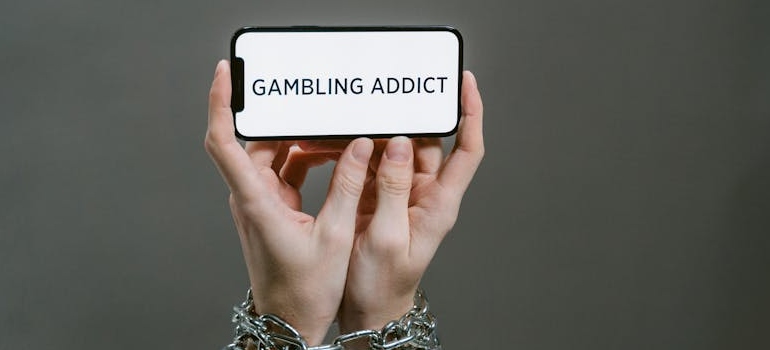Online gambling addiction is growing faster than ever. Gambling addiction was always a problem, but not everyone was able to access gambling or afford it. However, the development of technology changed both the accessibility and affordability of gambling, making more people lean into it and causing mental health issues. Online gambling addiction is more dangerous than ever, and many hidden risks are involved. For anyone struggling with addiction to gambling, our Massachusetts mental health center can provide professional support and guidance.

Learn about the risks associated with online gambling as well as what makes it more addictive and harder to control than traditional gambling options. Inform yourself about the role of technology in making online gambling dangerous. Finally, learn about the mental health, financial, and other consequences of gambling addiction to get the answer to the question of why online gambling addiction is more dangerous than ever.
The Rise of Online Gambling and Its Hidden Dangers
Today, the US is witnessing the rise of online gambling addiction and its impact on young adults, which was once limited to casinos in Las Vegas and Atlantic City. Experts are cautioning that lotteries and online games with gambling elements are now accessible to both adults and children. Evidence suggests that boys and men are particularly vulnerable to gambling addiction, as these demographic groups are most often participating in sports betting and video game-based gambling online.
What undoubtedly impacted the rise of online gambling is technology development. There are mobile apps and websites dedicated to gambling, making it available 24/7. Online sports betting, now legal in 39 states (plus Puerto Rico and Washington, D.C.), is contributing to worrisome numbers regarding online gambling addiction, as it is frequently considered yet another way to enjoy sports.
Technology has made online gambling more addictive than traditional gambling. It’s easily accessible and convenient for the majority of the population, resulting in gambling behavior becoming a component of everyday life, like watching television. With gambling becoming a routine daily behavior, it’s easier to engage in mindless consumption of that activity, ultimately resulting in addiction and addiction-related consequences. This entry into everyday life is one of the main reasons that online gambling addiction is more dangerous than ever.
Why Online Gambling Addiction Is Harder to Control
The brain’s reward system and dopamine rush play a key role in both gambling behavior and gambling addiction formation. Dopamine is the main neuromediator of incentive motivation, and it is released to a larger extent in pathological gamblers. The dopamine release is what makes gamblers repeat their behavior. It explains the illusion of control in online gambling and why it leads to addiction.
Dopamine release can increase excitement levels, reduce inhibition of risky decisions, or both. As it is connected to a sense of pleasure, a person experiencing this dopamine surge will link pleasurable sensations to the activity leading to it—in this case, gambling. Instant wins and losses will further contribute to repeated behavior with the aim of repeating gratification sensations. Coupled with a false sense of control, you will start engaging more with gambling or sports betting platforms, believing you can’t lose. As one of the gambling addiction treatment centers noticed in the patients, this out-of-control gambling only fuels compulsive behaviors.

The Financial Consequences of Online Gambling Addiction
One of the most obvious consequences of gambling is financial losses. Online gambling addiction is harder to detect than in-person gambling, but once a person struggling with it starts experiencing financial strains, it becomes obvious. As with any other addiction, pathological gambling is financially challenging to maintain, and quickly, a person finds themselves unable to cover unavoidable losses.
A pathological gambler will likely max out their credit card or digital wallet. Then, they start borrowing money from friends and family, risking ruining important relationships. Once that proves insufficient, they might start borrowing from sketchy people or obtaining money illegally, unavoidably leading to financial toll and potential ruin.
The Role of Technology in Making Online Gambling More Dangerous
As already mentioned, the role of technology in online gambling is undeniable. Technology is making online gambling addiction more dangerous, as it is ensuring its nonstop accessibility to different, often vulnerable, groups. Furthermore, AI-driven engagement strategies contribute to addiction development by causing a dopamine rush and a sense of urgency. This effect is one of the major factors behind the statement that online gambling addiction is more dangerous than ever.
Experts warn about platforms using real-time data to deliver personalized nudges (e.g., Recover your losses with the bonus) and target emotional triggers like the fear of missing out (FOMO). Additionally, personalized marketing and retargeting ads keep gamblers hooked and engaged.
Online games increasingly include features that look and feel like gambling. In-game gambling is particularly problematic because it primarily affects children and young adults and is associated with the development of gambling addiction. Two in-game gambling-like features are well-known: microtransactions and loot boxes.
- Microtransactions are virtual in-game purchases and can change how users play or how their character looks. Microtransactions can be made for loot boxes, new skins, power-ups, or in-game currency. These virtual purchases are made within apps using real money.
- Loot boxes are virtual treasure chests that can be opened in a game and contain random items that can help players advance, and they can be earned through gameplay or purchased using real money.
Scientific studies have drawn the following conclusions about the role of in-game gambling:
- Microtransaction engagement is associated with gaming and gambling disorders.
- Loot boxes appear to pose a greater risk for addiction than other microtransactions.
- Greater in-game expenditure increased with the risk of gambling disorder.

The Hidden Nature of Online Gambling Addiction
Online gambling addiction is harder to detect than in-person gambling, and there are several reasons for that.
- One of the main reasons for it is, again, technology. We are accustomed to seeing people constantly on their phones or using computers, so spending a significant amount of time on these devices doesn’t raise any red flags. Therefore, it’s easier to hide gambling habits.
- Similarly, it might take more time to detect that someone is struggling financially due to gambling addiction. Digital transactions and quick access to cash loans and credit cards often mean one’s spending habits can go unnoticed for a while.
- Finally, there is still much stigma surrounding gambling addiction, so even when a person notices they need help, they do not dare seek it.
Recognizing the signs that someone is struggling with gambling can help them seek support before major financial losses and mental health consequences appear.
How Online Gambling Affects Mental Health
Although challenging, financial consequences are easily observable and relatively simple to address. The impact of online gambling on health might be more difficult to notice at first, and it will certainly require professional intervention to address it.
From a medical perspective, gamblers are at increased risk of developing stress-related conditions, including hypertension, sleep deprivation, cardiovascular diseases, and peptic ulcer disease. Psychiatric consequences are mostly related to exacerbation of already existing or previously addressed conditions, such as major depressive disorder, anxiety disorder, and substance abuse disorder. Stress brought about by online gambling can also trigger other mental health conditions and cause psychosomatic consequences that could even require immediate CBT treatment for major depressive disorder.
Furthermore, psychological effects may also include intense levels of guilt and shame, deceptive practices, and heightened impulsivity or impaired decision-making. Such negative and intense feelings and thoughts can result in an increased risk of suicidal thoughts and attempts. It’s also not unusual for those struggling with gambling addiction to self-isolate or experience relationship breakdowns. This sort of behavior, unfortunately, further contributes to feelings of loneliness and shame, as they tend to lose the support they had and will need to overcome gambling addiction.

Why Online Gambling Addiction Recovery Is More Challenging Than Ever
Addiction is difficult to treat, and gambling addiction poses a specific challenge. One of the reasons it’s so difficult to address is the fact that it offers 24/7 accessibility. This is also the main reason behind the failure to deal with gambling addiction with self-exclusion programs.
While difficult, it’s not impossible to successfully deal with addiction to gambling. You might need specific programs, like professional help for sports betting addiction, addressing your particular type of struggle. Furthermore, you will benefit the most from tailored solutions, a combination of different approaches and treatments that address your needs.
At East Point Behavioral Health, we rely on evidence-based approaches, combining individual and group therapy to ensure the best results.
- Our IOP programs in Massachusetts help you identify the underlying causes of your gambling problem in one-on-one sessions. Your therapist is there to support and empower you. You will develop healthy coping mechanisms to help you deal with any current or future struggles.
- On the other hand, client centered group therapy relies on group dynamics to ensure you feel supported and inspired to make changes in your life. You will explore your gambling-related issues from a different perspective and get various inputs on how to deal with them.
Turn to Professionals for Help
Online gambling addiction is more dangerous than ever, but with proper support, you can fight it and avoid or reduce the negative consequences of it. We at East Point Behavioral Health Center can help you. Our experts can guide you and empower you to resist the urge to gamble. Call us to reclaim your life from addiction and live it to the fullest.
Sources:
https://www.forbes.com/sites/willyakowicz/2025/01/22/where-is-sports-betting-legal-america-2022
https://www.apa.org/monitor/2023/07/how-gambling-affects-the-brain
https://www.psychiatry.org/patients-families/gambling-disorder/what-is-gambling-disorder
https://pmc.ncbi.nlm.nih.gov/articles/PMC3004711
https://www.linkedin.com/pulse/betting-vulnerabilities-how-sports-gambling-industry-uses-atkinson-41qcc



